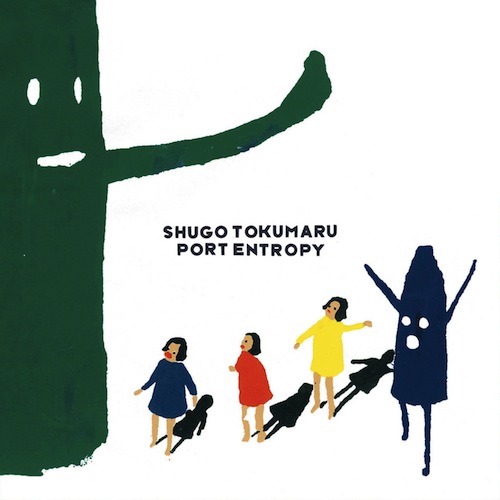On his fourth album, Shugo Tokumaru has created once again an abstract world space—the audio equivalent of a finely illustrated children’s book or animated film—designed for inhabitants still very much willing to engage an affinity for sounds of innocence and wonder. Unlike his earlier material, however, Tokumaru has now dropped the sounds of melancholy he presumably performed to show how difficult and taxing it was to manufacture such abstract world spaces. Port Entropy, if it can be described simply, is a celebration. Gone are the gloomy and introspective tracks lamenting the hostility of our adult reality. In their place is an album that is almost all bright colors and vibrancy. At times, this sunny outlook can be too much to bear.
There are two things that a listener first coming to Shugo will recognize immediately: (1) he’s singing in Japanese and (2) there are a whole lot of instruments being played. Tokumaru is a multi-instrumentalist and part of the appeal of listening to him is knowing that he is responsible for every sound you hear. Whether Tokumaru has enlisted the help of others for this album, this reviewer knows not (there’s a distinct crispness in the instrumentation that makes me think it’s possible he has brought in others to record at least some of the album parts—but he’s a Japanese artist with no American PR company and little is known about the man, so it’s anyone’s guess). Regardless, there’s still a ton of different instruments here—literally dozens—everything from little bells to wooden blocks and toy pianos. The overall effect of this variety, when combined with Shugo’s Japanese lyrics, is an general sound of otherness; an aesthetic that is foreign and different above all else. In the past, Shugo had presented his foreignness with conditions, essentially saying that his work was different, that he was sad about his isolation from the typical and conventional, and that if you wanted to join him as an outsider then you’d have to experience with him the sadness of being an outsider. That sadness that marked much of Shugo’s first three albums is entirely absent on Port Entropy.
On album standouts “Lahaha” and “Rum Hee,” Shugo’s guitar confidently leads both tracks in bouncing melodies that start quick and climax big. A bright flute and high-key piano line thrust forward on “Lahaha” as Tokumaru weaves together melodic lyrics and a strong guitar. With “Rum Hee,” Tokumaru tries his hand at a lowercase “a” anthem, belting out an infectious “Rum Hee—Rum Hee—Rum—Hee” while the many sounds of the song coalesce together around an invigorating climax. On album closer “Malerina,” Shugo shoots his voice through a processor and goes island-chic, dropping a head-nodding guitar line over a well-paced collection of percussion knocks. The album’s successes feel like victory laps; all positivity and big smiles. And because the lyrics are foreign, there’s no way to tell of Tokumaru’s intent beyond the overall mood of the sound itself. When Tokumaru scales himself back, as he does on the shuffle-footing “Suisha”, the slow parts, now sans-sadness, lose their emotional bite. Without the high-energy that’s present in his anthems and faster-pace songs, the slower tracks feel like pulse-less space fillers.
It’s nice to see that Tokumaru has shaken what seemed like guilt about trying to make a playful world filled with as many toy-instruments as possible. It’s unfortunate, however, that he has removed much of the emotional content that made his previous albums so rewarding on repeat listens. Like encountering a service industry professional with a well-practiced smile, you wonder in a way what kind of feelings are at work behind such a crafted presentation of happiness. Hopefully Shugo will invite us to explore this question with him on his next album.

